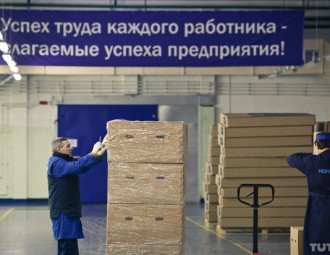State-run textile manufacturers remain in business only thanks to governmental subsidies

Despite numerous attempts to rescue the textile industry, in reality, the Belarusian authorities can do little to reverse the decline of the moribund industry, which will only continue to falter.
On 4 December, Aliaksandr Lukashenka cancelled his visit to JSC Kamvol, a major textile manufacturer located in Minsk.
The president threatened to pay an unexpected visit to this state-owned enterprise in the future and denounced its attempts to cover up problems ahead of his scheduled visit.
Kamvol received more than € 100 mln in state subsidies in the last seven years, but has not finished a single year with profit. Kramvol's workforce shrank by half during that period.
The decline of the enterprise mirrors the fate of many such companies in Belarus. Successful during the Soviet period, Belarus's textile manufacturers are struggling and lose customers to foreign companies today. And yet these companies continue to be subsidised by the authorities despite their increasing unprofitability.
The decline of a Soviet giant
Founded in 1955, Kamvol flourished while Belarus remained in the Soviet Union. During that time, the enterprise produced up to 22 million metres of fabric per year. Today Kramvol produces 10 times less fabric and faces a real possibility of closing.
Between 2009 and 2014, the number of Kamvol's employees decreased by half, reaching 797 people. Considering the general depression in the economy, the company's workforce may have shrunk even more in 2015.
According to the Ministry of Finance, Kamvol finished 2014 with a net loss of €1 million. The only year, in which the losses were negligible, was 2011. That year Belarus instituted triple devaluation, decreasing the price of Belarusian goods on the world market.
Kamvol’s problems became most acute in the winter of 2012, when Aliaksandr Lukashenka visited the factory.
During his visit, room temperature at the enterprise hovered around 0 degrees Celsius. Heating the company's space with 13-metre high ceilings was too expensive. The authorities also discovered that Kamvol's machines were worn off by 95%.
Enraged at the poor state of affairs, Lukashenka fired the plant's management and the leadership of the concern of the Belarusian light industry.
Modernising Kamvol
Even on the verge of bankruptcy, the company remains one of the largest manufacturers of fabric in the former Soviet Union. Kamvol also occupies a significant position in Belarus's light industry. At the same time, the company desperately needs to modernise in order to survive.
The Belarusian authorities have planned to modernise Kamvol for several years now. Lukashenka has repeatedly raised the issue with the company's management. On 4 December, after he had refused to visit the enterprise and claimed that its management had tried to whitewash Kamvol's problems, Lukashenka held another meeting on the status of the enterprise. He then announced an additional € 5 million in funding for the company.
In the last eight years Kamvol received more than € 100 million from the state. Yet the company remains unprofitable despite generous support.
Kamvol struggles financially for the same reasons that many other textile manufacturers in the post-Soviet space are going out of business. These companies cannot compete with Asian or Turkish producers. For example, Ivanov textile plant in Russia went bankrupt in 2001.
Yet unlike similar companies in other post-Soviet states, two dozen of Belarusian state-run textile manufacturers remain in business, propped by governmental subsidies. Like Kamvol, these companies performed strongest when the Belarusian rouble was devaluated in 2011. What makes the current crisis different from that of 2011, however, is that the Russian economy is also shrinking. Moscow now lacks money for buying Belarusian textile products.
The whole textile manufacturing, which accounts for 3% of the Belarusian industrial production, is on the decline. If textile manufactures go bankrupt, thousands of people will lose their jobs. Liudzmila Chanchavik, a seamstress from Brest, told Belarus Digest that most textile manufactures lack customers. She said she worked only two days per week this year.
Lukashenka is helpless
Saving Kamvol resembles the plot of film Groundhog Day. Dissatisfied with the enterprise, the government dismisses its management and increases subsidies to improve production. Kramvol invariably incurs losses, provoking a new round of dissatisfaction, followed by the reshuffling of management and financial inflows.
Lukashenka's promised surprise visit to Kamvol in 2016 will change nothing. The poor state of the company's affairs is common knowledge, and the solutions to Kramvol's problems remain out of reach.
A few years ago, the authorities proposed to develop a sheep breeding complex, in order to provide Kamvol with domestically produced raw material in the place of the wool imported from Russia. This plan has failed because creating a sheep breeding enterprise from scratch is costly and because Belarus lacks the meadows needed for grazing sheep.
The authorities have considered several other alternatives, such as attracting foreign direct investment or merging Kamvol with a successful weaving enterprise. In 2011 Turkish company De Textile declared readiness to invest in the company. But, like many foreign investors in Belarus, De Textile failed to come to an agreement with the Belarusian government.
A merger remains on the agenda, as it would allow to hide the Kamvol’s losses on paper. The government prepared a draft decree in 2014, but Lukashenka still is yet to sign it.
In reality, the Belarusian authorities can do little to reverse the decline of the moribund textile industry. Despite Lukashenka's personal engagement in the rescue operation and the large sums earmarked for the company, Kamvol will continue to falter.
Originally published at BelarusDigest
-
03.01
-
07.10
-
22.09
-
17.08
-
12.08
-
30.09










































